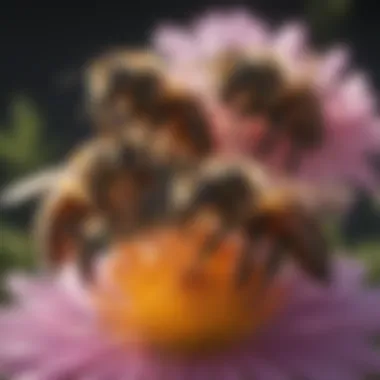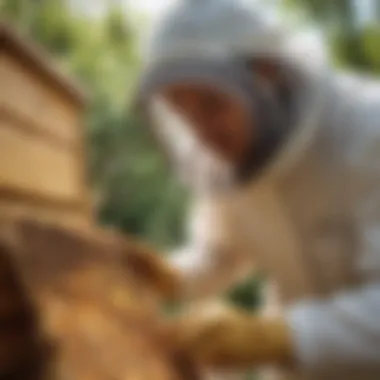Where to Buy Italian Honey Bees: A Comprehensive Guide


Intro
Acquiring Italian honey bees can seem like a perplexing task. Understanding where to buy these particular bees is essential for both novice and experienced beekeepers. The distinct characteristics of Italian honey bees, such as their gentle temperament and high honey production, make them a favored choice for many beekeepers. This guide aims to shed light on the nuances involved in sourcing these bees. It will explore reliable sources, considerations before purchasing, and the necessary steps after acquiring them.
Key Concepts and Terminology
Definition of Terms
Before embarking on the search for Italian honey bees, it is crucial to grasp important terms related to beekeeping:
- Apiary: A place where beehives are kept. Understanding apiary management is vital for successful beekeeping.
- Nucleus Colony (Nuc): A small, established colony used for building a productive hive. This can be a great start for beginners.
- Swarm: A group of bees that leave the parent hive to form a new colony. This behavior is natural but can be managed.
- Queen Bee: The pivotal female bee in a colony, responsible for reproduction.
Overview of Relevant Practices
When purchasing Italian honey bees, several practices should be noted. The most efficient purchase routes include:
- Local Beekeepers: Establishing connections with local beekeepers can provide additional insights into the quality of the bees and their specific needs.
- Reputable Suppliers: Finding a reliable vendor ensures that the bees are healthy and adapted to the local environment.
- Regular Workshops: Participating in beekeeping workshops can offer valuable skills that are beneficial when working with Italian honey bees.
Current Trends and Innovations
Latest Research and Developments
Research in apiculture is evolving. Recent studies emphasize the importance of genetically diverse bee populations. Diversity can enhance colony resilience against diseases and environmental changes. This aspect becomes especially significant when selecting Italian honey bees. Choosing bees with a robust genetic background aids in the colony's longevity and productivity.
Emerging Technologies and Tools
Modern beekeeping has welcomed a variety of technological advancements aimed at boosting bee health and productivity. Examples of these tools include:
- BeeScouts: Devices that monitor hive conditions, providing real-time data.
- Smart Hives: Hives equipped with sensors to track bee activity, temperature, and humidity levels.
- Health Monitoring Apps: Applications that assist beekeepers in maintaining accurate records of the hive's performance.
Practical Applications
Step-by-Step Guides
For those looking to purchase Italian honey bees, consider the following steps:
- Research Vendors: Start by compiling a list of reputable suppliers who specialize in Italian honey bees. Reviews and testimonials can be particularly helpful here.
- Assess the Health of the Bees: When possible, inspect the colonies for signs of illness or weakness. Healthy bees are essential for successful beekeeping.
- Understand Legal Considerations: Confirm any necessary permits or regulations surrounding the purchase of bees in your region.
- Post-Purchase Care Plan: Prepare for the integration of the bees into your apiary with a detailed care plan, focusing on acclimatization and feeding practices.
Troubleshooting Common Issues
Beekeeping isn’t without its challenges. Some common issues and their solutions include:
- Aggressiveness: If the Italian honey bees display aggressive behavior, evaluate environmental factors and consider re-queening.
- Low Honey Production: This could be due to inadequate foraging resources or hive space. Providing supplemental feeding may help.
- Disease Management: Familiarize yourself with common diseases such as Varroa mite and implement management practices promptly.
"Knowledge is the key to responsible beekeeping. Understanding your bees and their needs can lead to sustainable practices and a thriving apiary."
In summary, this comprehensive guide on where to buy Italian honey bees serves to highlight significant factors that impact your purchasing decision. From understanding key concepts to navigating current trends, this information aims to promote responsible and informed beekeeping.
Understanding Italian Honey Bees
The discussion around Italian honey bees is essential for anyone contemplating beekeeping. This section elucidates their characteristics, advantages, and potential challenges, providing a well-rounded understanding that can inform decisions about sourcing these bees.
Characteristics of Italian Honey Bees
Italian honey bees, scientifically known as Apis mellifera ligustica, offer distinct advantages due to their temperament and productivity. They are often recognized for their gentle disposition. This makes them easier to work with, particularly for new beekeepers. Their coloration is generally a golden yellow, which differentiates them from other subspecies.
Another notable characteristic is their resistance to cold weather. Unlike other bee types, Italian bees can maintain colony health even in cooler climates. They are also prolific foragers, meaning they collect pollen and nectar efficiently, contributing to higher honey yields. Additionally, these bees exhibit relatively low swarming tendencies, making colony management less taxing.
Benefits of Raising Italian Honey Bees
Raising Italian honey bees carries several benefits that can substantially enhance a beekeeper's experience. Some advantages include:
- High Honey Production: These bees are known for their ability to gather large amounts of nectar, leading to increased honey production.
- Gentle Nature: Their calm temperament generally results in fewer stings, increasing the comfort level for beekeepers.
- Strong Winter Survivors: Italian honey bees adapt well to varying climatic conditions, particularly during colder months.
- Quick Building of Colonies: They exhibit fast growth rates, allowing beekeepers to expand their operations more readily.
By considering these benefits, individuals can strategically position themselves for success in beekeeping endeavors.


Common Challenges in Beekeeping with Italian Bees
While raising Italian honey bees is rewarding, certain challenges exist that prospective beekeepers must acknowledge. These include:
- Pest Susceptibility: Italian bees can be more vulnerable to certain pests, like Varroa mites. Regular monitoring and control measures must be implemented.
- Behavior in Specific Weather Conditions: While they handle cold well, extreme heat can cause stress and reduced productivity.
- Potential for Drift: In environments with diverse bees, Italian honey bees might mix with other subspecies, which can affect genetic purity.
Awareness of these challenges can prepare beekeepers for maintaining healthy colonies and enjoying the extensive benefits Italian honey bees bring.
Sources for Purchasing Italian Honey Bees
When considering the acquisition of Italian honey bees, selecting the right source is crucial. The source can significantly affect the health and productivity of your bees. Quality sourcing ensures that you receive bees that are healthy, well-bred, and suited for your environment. It also allows you to support the practices of responsible beekeepers.
Local Beekeeping Associations
Local beekeeping associations often play a vital role in connecting new beekeepers with reliable sources for Italian honey bees. These associations typically have a network of local breeders and resources that can assist you in your purchasing decision. By contacting an association in your area, you can gain insights into the health and genetic background of bees sold locally. Additionally, many associations host events that allow prospective beekeepers to interact with experienced members. This engagement can be invaluable for understanding the practical aspects of beekeeping.
Some benefits of using local beekeeping associations for purchasing include:
- Established Relationships: Many breeders in the network have established long-standing reputations.
- Community Support: You gain access to a community of beekeepers who can provide advice and assistance.
- Diversity in Stock: Local sources may provide diverse bee stocks that are acclimatized to the regional climate.
Online Vendors
The rise of the internet has opened up a vast marketplace for purchasing Italian honey bees. Various online vendors specialize in selling bee packages and nucs directly to customers. This option offers convenience and a broader selection than might be available locally. However, it is essential to evaluate these vendors thoroughly before making a purchase.
When selecting online vendors, consider:
- Reputation: Look for vendors with positive reviews and a history of satisfied customers.
- Health Guarantees: Ensure the vendor provides health guarantees for their bees, minimizing the risk of disease.
- Shipping Policies: Understand the policies regarding shipping, as bees are live organisms that require careful handling.
Some reputable online vendors to consider include:
- Baker’s Bees
- Honeybee Genetics
- Hill Country Honey
Apiaries and Breeder Listings
Another option for sourcing Italian honey bees is through apiaries and breeder listings. Apiaries often provide a range of bee packages, nucs, and queens, with the added benefit of visiting the site to view the bees in person. This allows for a more hands-on approach to understanding the quality and health of the bees being purchased.
Before purchasing from an apiary, keep these points in mind:
- Visit the Apiary: If possible, visiting the site gives insights into the conditions the bees are raised in.
- Breeder Credentials: Check for credentials or certifications that ensure the breeder is knowledgeable in bee genetics and care.
- Ask Questions: Don’t hesitate to ask the breeder about their practices and the health history of the bees.
Utilizing local apiaries or breeder listings not only helps in acquiring healthy bees but also fosters local beekeeping skills and knowledge. Consider seeking out listings in places such as:
- Bee Culture magazine
- The American Bee Journal
- Local agricultural extension offices
The source of your bees can greatly influence their performance and survival. Always prioritize reputable dealers and breeders to ensure the healthiest start for your hive.
Considerations Before Buying
When you decide to purchase Italian honey bees, it is crucial to reflect on several key factors before making a commitment. Buying bees is not merely a transaction; it is a step towards a larger responsibility in beekeeping. Understanding the considerations before buying can lead to healthier bees and a more sustainable beekeeping experience.
Assessing Your Local Climate
Before you acquire Italian honey bees, evaluate your local climate. Italian bees are known for their adaptability, but they do have preferences. They thrive in mild climates. Understanding seasonal changes and average temperatures in your area is essential.
- Temperature Ranges: Know the minimum and maximum temperatures in your region. Italian bees can struggle in extreme cold or heat. A stable climate can keep your bees more productive.
- Humidity Levels: High humidity can lead to diseases like American Foulbrood. Ensure your location can manage moisture levels adequately.
- Floral Diversity: The availability of flowering plants throughout the seasons will greatly influence the health and honey production of your bees. Italy's native flora is rich, so consider your local planting options.
By taking the time to assess your local environment, you can prevent unnecessary struggles for your bees once they arrive at your apiary.
Understanding Bee Packages vs. Nucs
Another important element is to understand the differences between bee packages and nucleus colonies, or nucs. Each option has its pros and cons which cater to different levels of experience and specific needs of the beekeeper.
- Bee Packages: A bee package contains a queen bee and a cluster of worker bees. These are usually easier to transport and handle. However, they require extra care during the setup process. Managing these bees means overseeing their integration into a new hive on your property.
- Nucs: Nucs are smaller colonies that come in a box containing a queen and several brood frames. They are more established compared to bee packages. They are typically hardier and easier to manage for beginners. However, they can be harder to find and might be more expensive.
In summary, if you are new to beekeeping, a nuc may provide a gentler introduction to the process.


Evaluating the Credibility of the Seller
Finding a trustworthy seller cannot be overstated when considering your purchase. The credibility of the seller directly impacts the health of your bees and, consequently, your overall success in beekeeping. Here are some points to keep in mind as you evaluate potential sources:
- Reputation: Look for sellers with proven track records. Online reviews and testimonials from other beekeepers can provide insight into reliability.
- Transparency: A credible vendor will be open about their breeding practices and the health of their bees. They should provide their apiary health certifications readily.
- Local vs. Online: Local sellers may offer bees that are already acclimated to your environment. On the other hand, some online vendors can provide more extensive options but may come with risks linked to transportation.
"The seller’s credibility can shape not just your experience but also the lifespan and productivity of your bees."
By investing time into these considerations, you can lay a strong foundation for your beekeeping journey.
Legal Considerations
Understanding the legal aspects of beekeeping is crucial for anyone interested in acquiring Italian honey bees. Laws and regulations shape how beekeepers operate, ensuring that practices are sustainable and safe for both the bees and the environment. Compliance with legal requirements can prevent unexpected challenges and safeguard your investment. Failing to follow these regulations may lead to penalties or the loss of your bees.
State Regulations for Beekeeping
Beekeeping laws vary significantly from one state to another. Each state regulates the ownership, management, and transportation of bees. It is essential to research the specific regulations that apply in your location. For instance, some states require registration of beekeeping activities, which helps in disease control and tracking bee populations.
Here are key points to keep in mind:
- Registration: Many states require beekeepers to register their hives.
- Zoning Laws: Check local zoning laws to ensure that beekeeping is allowed in your area.
- Health Regulations: Compliance with health regulations helps prevent disease outbreaks.
Take the time to review your state’s regulations through its agricultural department or local beekeeping association websites.
Permits and Licensing
In addition to state regulations, certain aspects of beekeeping may necessitate specific permits or licenses. This is particularly relevant in urban areas or regions with strict agricultural policies. You may need to apply for permits to establish hives, especially if you plan to sell honey or other bee products.
Here are a few common requirements:
- Local Permits: Some municipalities require permits for hive placement.
- Business Licenses: If you intend to sell bee products, a business license may be necessary.
- Health Inspections: In some regions, beekeepers must have periodic health inspections.
Finding the correct paperwork ensures that your beekeeping activities remain lawful.
Import Regulations for Bees
If you are considering importing Italian honey bees from another country, you must adhere to specific import regulations. Importing bees can introduce diseases or pests into local populations, which is a primary concern for regulatory bodies.
Important aspects of import regulations include:
- Certification Requirements: Many countries require health certifications for imported bees to verify that they are disease-free.
- Quarantine Protocols: Specific quarantine measures may be necessary upon arrival to prevent the introduction of pathogens.
- Customs Clearance: Ensure that all import duties and regulations are complied with to avoid delays or confiscation.
Failure to understand these regulations can lead to serious consequences for your beekeeping venture. Always consult with local authorities or agricultural departments when planning to import bees.
By diligently navigating the legal considerations, beekeepers can foster a harmonious relationship with local ecosystems, ensuring that their practices are responsible and compliant.
Overall, being informed about legal considerations paves the way for responsible beekeeping. It protects the beekeeper and the surrounding environment, creating a sustainable experience in raising Italian honey bees.
Post-Purchase Considerations
Once you have successfully acquired your Italian honey bees, it is crucial to understand the steps and considerations needed to ensure their healthy development in your apiary. This phase plays a pivotal role in the overall success of your beekeeping practice. Proper acclimatization, attention to nutritional needs, and vigilant health monitoring can significantly impact your bees’ productivity and resilience.
Acclimatization to Your Apiary
Acclimatization refers to the process of helping your newly purchased bees adapt to their new environment. This step is essential due to several factors, including climate and local flora. Italian honey bees are particularly sensitive to temperature shifts, which can stress them during relocation.
First, select a suitable location for your hive. This area should provide ample sunlight and protection from harsh weather. Once your bees arrive, place them in the designated hive without delay. This immediate transition minimizes the time spent in their transport box, reducing stress.
In the first few days, observe your bees closely. Avoid opening the hive too frequently. Give them time to settle in. After about three days, you may start gentle inspections to check for signs of activity and health. Ensure they have access to water and forage nearby to support their transition.
Feeding and Nutritional Needs
Feeding your Italian honey bees correctly after purchase is vital. They need adequate nutrition to build wax, raise young bees, and produce honey. Begin with a 1:1 sugar-to-water solution to help stimulate their interest in foraging.
For optimal health, consider supplementing their diet with protein sources such as pollen patties or commercially available protein supplements. This practice is especially important if local forage is limited during the initial weeks of setting up your hive. A strong, nutritious start sets the tone for a successful season.


Keep in mind that bees need diverse foods to thrive. Regularly evaluate their food supplies and replenish as needed, especially during early spring periods when natural food sources might not be sufficient.
Monitoring Bee Health
Regular health monitoring is crucial to maintaining a thriving colony of Italian honey bees. Early detection of issues can prevent larger outbreaks or colony collapse. Be observant of changes in behavior or hive activity.
Look for indications of disease or pests such as Varroa mites. Inspect the hive weekly for population strength, brood patterns, and overall cleanliness. Healthy colonies demonstrate active foraging and consistent brood development.
Utilizing a management calendar can be helpful for tracking inspections and interventions. Incorporate treatments for common pests based on the season and your local environment. Establishing a routine allows you to identify any health issues rapidly.
Proper management and monitoring of your Italian honey bees can lead to a bountiful honey harvest and a resilient apiary.
As you consider these post-purchase elements, remember that being attentive and proactive establishes a foundation for a thriving beekeeping experience. Adequate acclimatization, feeding, and health monitoring are not just tasks they are integral components of a successful beekeeping journey.
Ethical Sourcing of Bees
Ethical sourcing of bees is an essential part of beekeeping that extends beyond mere procurement. It involves understanding the environmental and social impacts associated with bee acquisition. This approach not only ensures the health of local ecosystems but also promotes responsible practices among beekeepers and suppliers. The benefits of ethical sourcing are numerous; they include the preservation of biodiversity and support for sustainable farming initiatives. Furthermore, ethically sourced bees are often healthier, as they are bred and maintained in more optimal conditions.
Impacts of Bee Removal on Ecosystems
Removing bees from their natural or original habitats can lead to various negative consequences. One prominent impact is the disruption of pollination cycles essential for many plant species. If bee populations decline or are irresponsibly relocated, crops and wild plants may suffer, resulting in reduced food production and biodiversity loss.
Additionally, bee removal can disturb the delicate balance within ecosystems. Bees play a significant role in supporting other species through pollination. Their absence can lead to a cascading effect, affecting birds and other insects that rely on plants for food and habitat. As farmers and enthusiasts, it is important to recognize these impacts when sourcing bees.
To combat these issues, beekeepers should prioritize finding bees that are bred locally or harvested sustainably. Supporting local beekeepers can enhance the ecological integrity of farming practices.
Supporting Sustainable Beekeeping Practices
Sustainable beekeeping practices are part and parcel of ethical sourcing. By employing methods that are considerate of the environment, beekeepers can ensure that their activities do not detract from local wildlife or habitat.
Some key elements of sustainable beekeeping include:
- Utilizing Organic Practices: Avoid pesticides and untreated materials that can harm bee populations.
- Promoting Genetic Diversity: Source bees from a variety of locations to maintain a robust gene pool.
- Participating in Local Apiary Programs: Engage in local programs that emphasize ecological sustainability.
Supporting vendors and breeders who prioritize sustainability can lead to healthier bees and contribute positively to the environment. By adopting these practices, beekeepers ensure the longevity of bee populations and the ecosystems they support. In addition, consumers are encouraged to ask vendors about their sourcing habits and how they align with sustainable practices.
"Ethical sourcing strengthens not just individual beekeeping operations but also entire ecosystems."
Understanding ethical sourcing goes beyond personal ethics; it shapes the future of beekeeping and agricultural practices. As stewards of the land, beekeepers must make conscious decisions that impact not only their businesses but the world at large.
Expert Recommendations
When procuring Italian honey bees, expert recommendations play a crucial role. They guide prospective beekeepers towards reliable vendors, ensuring the purchase of healthy and high-quality bees. Understanding the recommendations from seasoned apiarists can also help in navigating the complexities associated with selecting suppliers. These experts often emphasize the importance of sourcing bees from reputable breeders who prioritize bee wellness and genetic diversity, aspects critical for successful beekeeping.
Engaging with recommendations also involves recognizing local nuances. Factors like regional climate and specific gardening practices can influence the adaptability of your bees. Thus, seeking advice from experts in your area can provide insights that go beyond the general knowledge available online. Furthermore, this interaction can assist in building a supportive community, fostering shared experiences among beekeepers.
Top Vendors for Italian Honey Bees
Choosing the right vendor can greatly impact the success of your beekeeping endeavors. Many top vendors specialize in providing Italian honey bees, known for their gentle temperament and excellent foraging skills. Here are some established names in the industry:
- Honey Bee Genetics: Offers a variety of queen bees and packages with comprehensive support.
- Mann Lake: A well-known supplier with a range of bee products, including Italian honey bees.
- Bee Weaver: They focus on breeding bees that are resistant to various diseases, offering solid options for Italian honey bees.
When selecting a vendor, consider factors such as their location and shipping options. Local vendors may provide acclimatized bees, potentially improving their survival in your area.
Important Questions to Ask Sellers
In the pursuit of acquiring Italian honey bees, asking the right questions is essential. It ensures that you make informed decisions and helps to establish a relationship of trust with the seller. Key questions to pose include the following:
- What is the origin of the bees? Knowing where the bees come from will give insight into their genetic health.
- What is the health status of the hive? Inquire about any recent inspections or treatments that have been administered to the bees.
- Can you provide references? A reputable seller should have satisfied customers who can vouch for them.
- Do you provide any guarantees? Understanding the seller's policies in terms of replacements or refunds is vital for peace of mind.
- What kind of support do you offer post-purchase? Adequate follow-up assistance can be invaluable, especially for novice beekeepers.
These questions will help clarify any uncertainties and guide you towards a beneficial purchase experience.
The End
Acquiring Italian honey bees is a significant step for both novice and seasoned beekeepers. In this article, we explored various elements crucial for making an informed purchase. These elements range from understanding the sources where bees can be acquired to navigating the legal considerations that accompany beekeeping.
Summarizing Key Points
As we summarized, key points from this guide include:
- Understanding the characteristics of Italian honey bees: Recognizing traits that make this species unique aids in their management.
- Reliable sources for purchasing: Local beekeeping associations and reputable online vendors were highlighted as primary sources.
- Considerations before buying: Evaluating local climate and choosing between bee packages or nucs are critical for successful integration into your apiary.
- Legal considerations: Awareness of regulations is necessary to ensure compliance and avoid penalties.
- Post-purchase care: Proper acclimatization and monitoring bee health are pivotal for establishing a thriving colony.
- Ethical sourcing: Supporting sustainable practices is essential for maintaining ecological balance.







